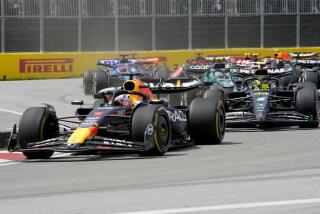Driver scores one for diversity
- Share via
Lewis Hamilton drove home his point to the planet Sunday: He is not just Formula One’s first black driver, but its best and most brilliant rookie ever.
Winning the Canadian Grand Prix with ease, Hamilton, a 22-year-old Briton, became the first driver of African descent to win a major automobile race, ever, anywhere.
Taking sole possession of the world championship points lead, Hamilton hurtled on, relentlessly, toward becoming a Tiger Woods on wheels.
“This is history,” he told international media at Montreal after Sunday’s landmark win, simply stating and accepting the fact of his role, as the news flashed around the world.
When the late Wendell Scott became the only black driver ever to win a NASCAR race (an obscure one at that), in 1963, on a dirt track at Jacksonville, Fla., his victory wasn’t even announced to the crowd.
Buck Baker, who actually finished two laps behind Scott, was declared the winner on the spot.
Only days later, in a news release, did NASCAR reveal the truth.
Hamilton’s win was, if anything, overdue. His McLaren-Mercedes team was already in trouble with the Federation Internationale de l’Automobile for bridling him in the last race, the Monaco Grand Prix on May 27. There, he finished second to teammate Fernando Alonso, even after the “slow down” order.
Through six F1 races, his worst finish is third, in the season opener in Australia. Since then it is an understatement to say he has finished no worse than second. From Malaysia to Monaco, he has driven more brilliantly than the results indicate.
Sunday at Montreal, it wasn’t nearly as close as Hamilton’s 4.3-second margin of victory over Germany’s Nick Heidfeld indicated. Hamilton led most of the time by well over five seconds.
Alonso, world champion the last two years, kept bumbling after his first mistake, trying to beat his teammate into the first corner.
Nowadays, NASCAR, operating under the mantra, “We want to look more like America,” is pushing its Drive for Diversity program. But even its most promising minority drivers are still deep in the pipeline, years away from groundbreaking success.
Formula One has driven onto NASCAR’s home continent and won the race to diversity in a runaway.
The Canadian Grand Prix was telecast live by Fox, in the afternoon U.S. time, rather than the dawn starts on cable channels from Europe. Many American racing fans, waiting out a long rain delay for Sunday’s NASCAR race in Pennsylvania, probably joined the usual 300 million who watch F1 worldwide.
And the next stop for F1 is Indianapolis, in next Sunday’s U.S. Grand Prix.
Formula One is the realm previously deemed impenetrable to all but drivers who were enormously wealthy and/or who could bring lucrative sponsorships with them.
Hamilton has triumphed, quite simply, on a level playing field.
His paternal grandparents migrated to England from the Caribbean island of Grenada. His father, Anthony Hamilton, bought Lewis a go-kart when he was 8.
From there, young Hamilton proved such a prodigy that he was noticed by McLaren-Mercedes moguls Ron Dennis and Norbert Haug at age 13, and signed to a long-term development contract by the team at 14.
Hamilton has proved not only talented enough but wise enough. Formula One is the most cerebral way to race in the world, requiring the judgments of a supercomputer every split-second of each two-hour race. Then, every other moment, one must handle oneself in public as well -- no, much better than -- any international film star.
At the pinnacle of such a world, Lewis Hamilton arrived Sunday.
--
Ed Hinton covers auto racing for Tribune newspapers.
More to Read
Go beyond the scoreboard
Get the latest on L.A.'s teams in the daily Sports Report newsletter.
You may occasionally receive promotional content from the Los Angeles Times.










